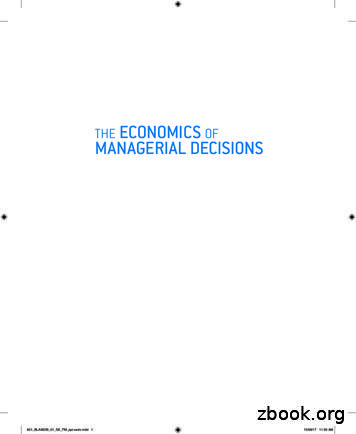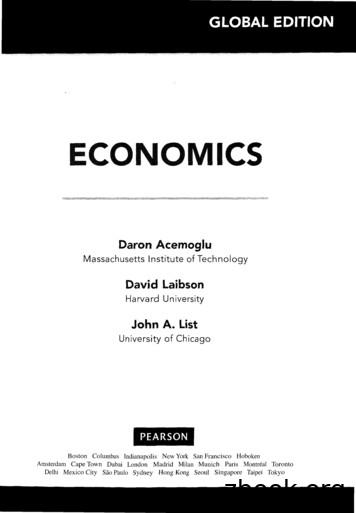Foundations Of Managerial Economics-PDF Free Download
Managerial Economics way, managerial economics may be considered as economics applied to “problems of choice’’ or alternatives and allocation of scarce resources by the firms. 1.2 MEANING OF MANAGERIAL ECONOMICS Managerial Economics is a discipline that combines e
Managerial Economics as a subject gained popularly in U.S.A after the publication of the book “Managerial Economics” by Joel Dean in 1951. Joel Dean observed that managerial Economics shows how economic analysis can be used in formulating policies. Managerial economics bridges the
ÿ Managerial economics differs from microeconomics in that microeco-nomics focuses on description and prediction while managerial eco-nomics is prescriptive. ÿ Managerial economics prescribes behavior, whereas microeconomics describes the environment. ÿ Managerial economics is an integrative course that brings the various
1. Essentials of Business Economics- D N Dwivedi, Vikas Publications. 2. Managerial Economics - Dom inick Sal watore . 3. Managerial Economics - Gupta and Mote 4. Economics - Samuel son & N or dhaus 5. Managerial Economics by Peterson and Lewis 6. Micro Economics – Dominick Salvatore 7. Macro Economics –
Managerial Economics, Suma Damodaran, Oxford. Macro Economics by MN Jhingan-Oxford Managerial Economics- Dr.DM.Mithani-Himalaya Publishers Managerial Economics-Dr.H.L Ahuja-S.Chand and Com pvt ltd, NewDelhi Manageria
Managerial Economics is ‘Normative’ Universal applicability The roots of Managerial Economics came from Micro Economics Relation of Managerial Economics to Economic Theory is much like that of Engineering to Physics or Medicine to Biology. It is the relation of applied field to basic fundamental disciplin
1. Managerial Economics – Analysis, Problems and Cases, P.L. Mehta, Sultan Chand Sons, New Delhi 2. Managerial Economics – Varshney and Maheshwari, Sultan Chand and Sons, New Delhi 3. Managerial Economics – D. Salvatore, McGraw Hill, New Delhi 4. Managerial Economics – Pearson and Lewis, Prentice Hall, New Delhi 5.
1 Syllabus: Managerial Economics MBA 790 University of Dayton School of Business Administration Instructor: Ralph R. Frasca, Ph.D. 515 Miriam Hall 937 229-2405 frasca@udayton.edu Classes: Managerial Economics - MBA 790 – 01 Class: 12:00 pm - 2:30 pm, Thursday Room Miriam Hall 109 Managerial Economics - MBA 790 - 02
“Managerial Economics applies economic theory and methods to business and administrative decision-making. Because it uses the tools and techniques of economic analysis to solve managerial problems, managerial economics links traditional economics with decision sciences to develop important t
managerial economics, managerial issues are resolved daily and difficult issues of economic theory are kept at bay. 4. Uses theory of firm: Managerial economics employs economic concepts and principles, which are known as the theory of Firm or 'Economics of the Firm'. Thus, its scope is narrower than that of pure economic theory. 5.
International Finance 14. Development Policy 15. Institutional Economics 16. Financial Markets 17. Managerial Economics. 13 18. Political Economy 19. Industrial Economics 20. Transport Economics 21. Health Economics 22. Experimental and Behavioral Economics 23. Urban Economics 24. Regional Economics 25. Poverty and Income Distribution
Managerial Economics Klein Mathematical Methods for Economics Krugman/Obstfeld/Melitz International Economics: Theory & Policy* Laidler The Demand for Money Lynn Economic Development: Theory and Practice for a Divided World Miller Economics Today* Miller/Benjamin The Economics of Macro Issues Miller/Benjamin/North The Economics of Public Issues .
H2: Financial Versus Managerial Accounting 5) A budget is a managerial accounting tool used in the planning process. Answer: TRUE Diff: 1 LO: 16-1 AICPA Functional: Reporting PE Question Type: Concept H2: Financial Versus Managerial Accounting Test Bank for Horngrens Financial and Managerial Accounting The Managerial Chapters 5th Edition by .
Unit: 01 INTRODUCTION TO ECONOMICS & MANAGERIAL ECONOMICS [9 Hours] Basic principles of Economics & concepts like Scarcity & Choice, Economic activities, Circular flow model and Central Problems, GDP and National Income, etc. Managerial Economics: nature & scope of Managerial Economics, Fundamental principl
“Managerial Economics applies economic theory and methods to business and administrative decision-making. Because it uses the tools and techniques of economic analysis to solve managerial problems, managerial economics links traditional economics with decision sciences to develop importan
Managerial Economics UNIT 1: Introduction to Managerial Economics: Definition, Nature and Scope, Relationship with other areas in Economics, The role of managerial economist. Concept of opportunity cost, Incremental concept, time . Dominick Salvatore: “Managerial Economi
“Managerial economics is the application of economic theory and methodology to decision-making problems faced by both public and private institutions”. Managerial economics studies the application of the principles, techniques and concepts of economics to managerial problems
Std. 12th Economics Smart Notes, Commerce and Arts (MH Board) Author: Target Publications Subject: Economics Keywords: economics notes class 12, 12th commerce, 12th economics book , 12th commerce books, class 12 economics book, maharashtra state board books for 12th, smart notes, 12th std economics book , 12th economics book maharashtra board, 12th economics guide , maharashtra hsc board .
of Managerial Finance page 2 Introduction to Managerial Finance 1 Starbucks—A Taste for Growth page 3 1.1 Finance and Business What Is Finance? 4 Major Areas and Opportunities in Finance 4 Legal Forms of Business Organization 5 Why Study Managerial Finance? Review Questions 9 1.2 The Managerial Finance Function 9 Organization of the Finance
PART 8 Special Topics in Managerial Finance 725 17 Hybrid and Derivative Securities 726 18 Mergers, LBOs, Divestitures, and Business Failure 765 19 International Managerial Finance 809 Appendix A-1 Glossary G-1 Index I-1 PART 1 Introduction to Managerial Finance 1 1 The Role of Managerial Finance 2
Horngren, Datar & Rajan. Cost Accounting: A Managerial Emphasis, 14th Ed. 2012 Reference Books Garison. Noreen and Brewer, Managerial Accounting, 13th Ed. 2010 Gray and Ricketts; “Cost and Managerial Accounting” Heltger and Matulich; “Managerial Accounting” Moore - Jaedicke- Anderson; “Managerial Accounting”
Notes LOVELY PROFESSIONAL UNIVERSITY 1 Unit 1: Basic Concepts of Economics CONTENTS Objectives Introduction 1.1 Defi nition of Economics 1.2 Scope of Economics 1.3 Types of Economics and its use in Managerial Decisions 1.3.1 Economics and Managerial Decision-making 1.3.2 Central Problems o
1 Managerial Economics and Decision Making 1 Managers at Sears Holdings Use Opportunity Cost to Make Tough Decisions 1 Introduction 1 1.1 Managerial Economics and Your Career 2 1.2 Firms and Their Organizational Structure 3 Definition of a Firm 3 The Legal Organization of Fi
Managerial Economics and Business Strategy is the best-selling managerial economics textbook on the market today. Michael Baye provides students with tools like intermediate microeconomics, game theory, and industrial organization that are crucial
Most business school educators would agree that managerial decision-making should be informed by economic reasoning. To that end, business curricula typically include at least one course in microeconomics at the principles level, and many require an additional course in managerial economics. If economics p
Douglas - “Managerial economics is the application of economic principles and methodologies to the decision-making process within the firm or organization.” Pappas & Hirschey - “Managerial economics
ECONOMICS 40 Chapter 1: The Principles and Practica of Economics 40 1.1 The Scope of Economics 41 Economic Agents and Economic Resources 41 Definition of Economics 42 Positive Economics and Normative Economics 43 Microeconomics and Macroeconomics 44 1.2 Three Principles of Economics
Behavioral Economics Experimental Economics Macroeconomics and Public Sector Economics Monetary Policy Fiscal Policy Cost-Benefit Analysis Economics of Regulations and Competitive Economy Labour and Population Labour Economics Population Economics Human Resource Development Islamic Economics Islamic Banking: Theory and Practice
Christopher R. Thomas and S. Charles Maurice, 2015, Managerial Economics: Foundations of Business Analysis and Strategy (11e, English Version), China Machine Press. (hereinafter T&M) Recommended book: David Besanko, David Dranove, Mark Shanley and Scott Schaefer, 2017, Economics of Strategy
Managerial Economics and Business Strategy Michael R. Baye Bert Elwert Professor of Business Economics & Public Policy Kelley School of Business Indiana University Jeffrey T. Prince Associate Professor of Business Economics & Public Policy Harold A. Poling Chair in Strategie Management Kell
Economics and Managerial Decision Making Trupti Mishra SJMSOM IIT Bombay Relationship to other business disciplines –Strategy: Types of Competition, Structure-Conduct-Performance Analysis –Managerial
concepts which are useful in deciding the business strategy of a unit of management. Managerial economics is designed to provide a rigorous treatment of those aspects of economic theory and analysis that are most use for managerial
excess returns over the risk-free rate of each portfolio, and the excess returns of the long- . Journal of Financial Economics, Journal of Financial Markets Journal of Financial Economics. Journal of Financial Economics. Journal of Financial Economics Journal of Financial Economics Journal of Financial Economics Journal of Financial Economics .
Labor Economics, Public Economics, Applied Econometrics, and Economics of Education Tia Hilmer, Professor O ce: NH-317, Email: chilmer@sdsu.edu Econometrics, Natural Resources, Environmental Economics . Mathematical Economics (3) Prerequisite: Mathematics 124 or 150. Recommended: Economics 320 or 321. .
Managerial Accounting Study Guide . Table of Contents 1. Introduction to Managerial Accounting 2. Introduction to Cost Terms and Cost Concepts . It is important to note that even though financial accounting reports are aimed primarily at external users and managerial accounting reports are aimed primarily at internal users, managers also make .
Garrison, Managerial Accounting, 12th Edition 3 True/False Questions 1. Although financial and managerial accounting differ in many ways, they are similar in that both rely on the same underlying financial data. Answer: True Level: Medium LO: 1 2. Managerial accounting is a branch of financial accounting and serves essentially the
Managerial Accounting Managers make numerous decisions during the day-to-day operations of a business and in planning for the future. Managerial accounting provides much of the informa-tion used for these decisions. Some examples of managerial accounting information along with the chapte
managers play a major role in corporate decision-making and their duties are roughly standardized across U.S. firms. 2 In terms of managerial trait, we focus on one of the most-studied managerial biases, overconfidence. 3. Following the empir
Financial vs. Managerial Accounting Page 2 of 2 Problem: Financial vs. Managerial Solution: Financial vs. Managerial. Understanding the Costs of Operating a Business Costs associated with the goo
possible alternative managerial actions. 4. Network Modification. Monitoring may indicate that the net-work plan will have to be altered to maintain necessary managerial control. Evolution of Network Analysis Contemporary network approaches to managerial planning and control have combined several evolving managerial technologies. These













![Core Course [MBA First Semester] Course Name: Management .](/img/76/syllabus-mba.jpg)

























